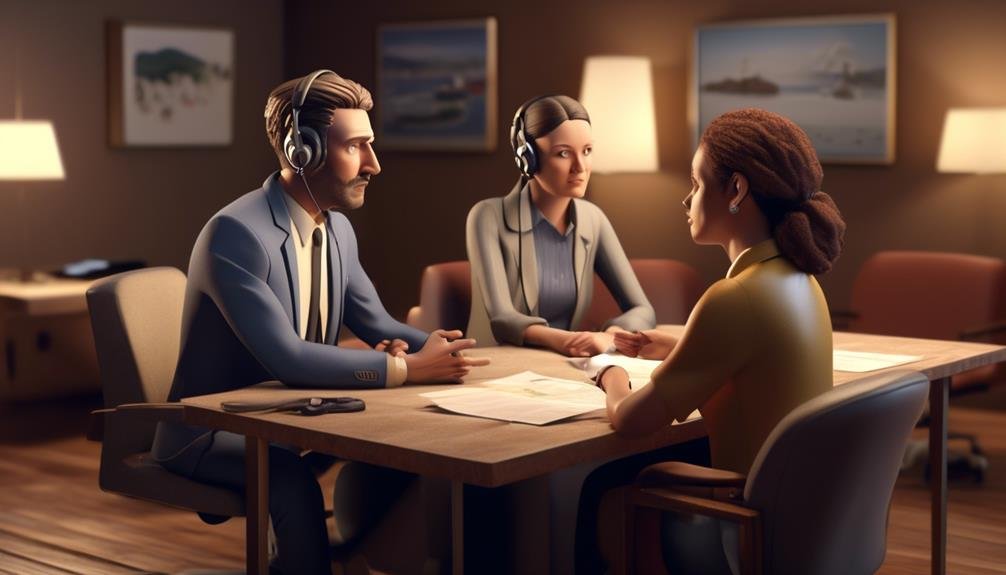Conflict Resolution Strategies for Travel Agencies
Have you ever wondered why conflicts in travel agencies seem to escalate quickly and disrupt the smooth operation of the business?
It's essential for travel agencies to have effective conflict resolution strategies in place to maintain positive relationships with clients, partners, and employees.
By implementing proven techniques and establishing clear policies, travel agencies can effectively navigate and resolve conflicts as they arise.
But what are these strategies, and how can they be applied in a real-world setting to ensure successful conflict resolution?
Key Takeaways
- Effective communication techniques such as active listening and clear communication are essential for resolving conflicts in travel agencies.
- Clear policies and procedures that are clearly communicated and enforced can help prevent conflicts and create a culture of accountability.
- Mediation and arbitration can be effective strategies for resolving conflicts in travel agencies, providing a neutral and structured environment for negotiation and decision-making.
- Building positive relationships and trust through trust-building activities, relationship-building workshops, and personalized communication can help prevent conflicts and improve conflict resolution in travel agencies.
Understanding Common Conflict Triggers
Identify common conflict triggers to proactively address and resolve potential issues in your travel agency.
Recognizing signs of conflict before they escalate is crucial for maintaining a positive work environment and providing excellent customer service.
One common trigger is miscommunication, which can lead to misunderstandings and frustration among team members or with clients. By addressing triggers like unclear instructions or vague communication promptly, you can prevent conflicts from arising.
Another trigger to be mindful of is unrealistic expectations. When clients have unrealistic demands or expectations that can't be met, it often leads to dissatisfaction and potential conflicts. By setting clear and realistic expectations from the beginning and managing client expectations effectively, you can mitigate this trigger and minimize potential conflicts.
In addition, conflicting priorities and goals within the team can also be a significant trigger for conflicts. Recognizing signs of misaligned objectives or conflicting priorities and addressing them proactively can help prevent tensions from escalating.
Effective Communication Techniques
Addressing conflict triggers such as miscommunication and unrealistic expectations requires implementing effective communication techniques within your travel agency. Active listening and attentiveness to nonverbal cues are essential to ensure clear and accurate communication with both clients and colleagues. By actively listening to the concerns and feedback of your clients, you can demonstrate empathy and understanding, leading to a more positive and effective resolution of any conflicts that may arise. Additionally, being attentive to nonverbal cues such as body language and facial expressions can provide valuable insight into the emotions and reactions of others, allowing you to adjust your communication approach accordingly.
| Effective Communication Techniques |
|---|
| Active Listening |
| Nonverbal Cues |
| Clear and Open Communication |
| Empathetic Understanding |
| Adaptability in Communication |
Establishing Clear Policies and Procedures

To ensure efficient operations and minimize misunderstandings, clearly outlining and communicating policies and procedures is pivotal for your travel agency's success. Policy enforcement is crucial in maintaining order and consistency within your agency. Clearly defined policies regarding customer interactions, booking processes, and employee conduct provide a framework for decision-making and help prevent conflicts. By establishing policies that outline the consequences of non-compliance, you create a culture of accountability and professionalism.
In addition to policies, procedure compliance is equally important. Clearly documented procedures for tasks such as handling customer complaints, processing bookings, and managing refunds ensure that operations run smoothly and consistently. Encouraging employees to adhere to these procedures fosters a sense of reliability and trustworthiness, both internally and externally.
Regular training and communication are essential to ensure that all staff members are aware of and understand the policies and procedures in place. This will also provide opportunities for feedback and improvement. By consistently reinforcing the importance of policy enforcement and procedure compliance, you can create a cohesive and efficient working environment within your travel agency.
Implementing Mediation and Arbitration
Considering the potential for disputes to arise in your travel agency, incorporating mediation and arbitration processes can be instrumental in resolving conflicts effectively and efficiently.
When conflicts escalate, negotiation skills and conflict de-escalation techniques are vital for finding common ground and reaching mutually acceptable solutions. By implementing mediation, you can provide a neutral and structured environment for parties to discuss their issues with the help of an impartial mediator. This allows for a more amicable resolution while preserving relationships and reputation.
Arbitration, on the other hand, offers a more formal approach to conflict resolution. It involves bringing in a third party to make a decision after considering all sides of the dispute. This process can be particularly useful for resolving complex or high-stakes conflicts where reaching a mutual agreement seems challenging. The impartiality of the arbitrator ensures a fair and unbiased resolution.
Building Positive Relationships and Trust

Fostering positive relationships and trust with your clients is essential for the success of your travel agency. Building strong connections and trust can lead to repeat business and positive referrals.
To achieve this, consider implementing the following strategies:
- Trust Building Activities: Engage in activities that specifically aim to build trust with your clients. This could include offering transparent pricing, providing reliable and accurate information, and ensuring the safety and security of your clients during their travels.
- Relationship Building Workshops: Host workshops or events focused on building relationships with your clients. This could involve inviting them to meet-and-greet sessions, travel-themed social events, or educational workshops about destinations and travel tips.
- Personalized Communication: Tailor your communication to each client, addressing their specific needs and preferences. This personal touch can go a long way in building trust and rapport.
- Consistent Quality Service: Consistency in delivering high-quality service is crucial for building trust. Ensure that every interaction with your clients reflects your commitment to excellence.
- Seek Feedback and Act on It: Encourage clients to provide feedback and take their suggestions and concerns seriously. This demonstrates your dedication to continuously improving your services and building trust with your clients.
Conclusion
Now that you've learned about conflict resolution strategies for travel agencies, it's time to put them into action.
By implementing effective communication techniques, clear policies and procedures, and mediation and arbitration, you can create a positive and trusting environment for your team and clients.
Stay tuned for the positive impact these strategies will have on your agency's success and reputation in the travel industry.




